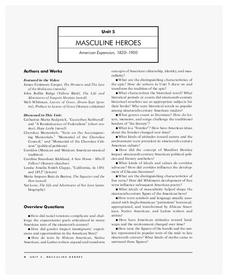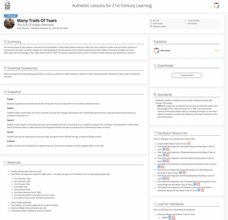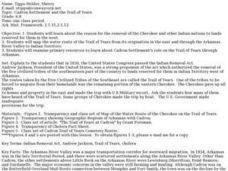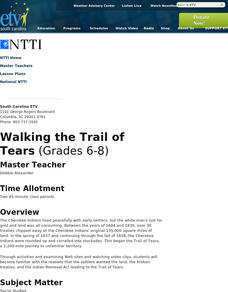Core Knowledge Foundation
Westward Expansion Tell It Again!™ Read-Aloud Anthology
The westward expansion is the focus of a read-aloud anthology. Pupils will listen to and discuss stories about going West, an adventure on the Erie Canal, the Trail of Tears, the Oregon Trail, the Pony Express, and the transcontinental...
Annenberg Foundation
Masculine Heroes
What were the driving forces behind American expansion in the nineteenth century, and what were its effects? Scholars watch a video, read biographies, engage in discussion, write journals and poetry, draw, and create a multimedia...
Curated OER
Trail of Tears
A fabulous PowerPoint resource that thoroughly and accurately desicribes the Cherokee culture from the 1500's through the mid-1800's when they were forced to leave their homeland and march to Oklahoma in the famous, "Trail of Tears."...
Curated OER
Food Traditions: Making Cherokee Bean Bread
Imagine being forced out of your home and walking over 1,000 miles with only the things you could carry. How would you survive? What would you eat? After reading about the Trail of Tears and Cherokee resilience, middle schoolers are...
K20 LEARN
Worcester v. Georgia: Cherokee Sovereignty and Actions of the U.S. Government
Young historians study the Supreme Court case "Worcester v. Georgia" and note instances where the Justices defended the sovereign rights of the Cherokee. They also examine the actions of President Andrew Jackson and the...
K20 LEARN
Many Trails of Tears: The Era of Indian Removal
Cherokee, Chickasaw, Choctaw, Creek, and Seminole. All were forced off their ancestral lands in the southeastern United States as part of the Indian Removal Act of 1830. Young historians research the tribes' reactions to this removal and...
Mr. Nussbaum
Trail of Tears
An interactive practice boosts reading comprehension skills. Scholars read an informative text, then show what they know by answering 10 questions. A progress report details their answers and overall score.
State Bar of Texas
Worcester v. Georgia
Can the president of the United States defy the rulings of the Supreme Court? Students investigate the case of Worcester v. Georgia and the impact it had on society and, most importantly, Native Americans. Using a short video clip as...
Smithsonian Institution
Eastern Indian Wars
Many know that Native Americans were forced off their lands and moved west, but how did these people react? The Red Sticks faction of the Creek nation opted to defend themselves and their lands in a series of wars called the Eastern...
Alabama Department of Archives and History
Jacksonian Democracy and Indian Removal
Introduce a study of the presidency of Andrew Jackson with a lesson that uses video clips, primary source documents, group activities, and debates to examine Jackson's early life and career. The lesson focuses on the 1828 election and...
Curated OER
Tennessee's Presidents: Andrew Jackson
Learn about the life, career, and policies established by President Andrew Jackson. Young historians can easily follow along with this resource or read about Jackson at an independent work station. Biographical information includes major...
Curated OER
Andrew Jackson: 1767-1845
A thorough examination of Andrew Jackson's presidency and politics, these slides contain important facts and pictures of the growing United States. Events such as the Trail of Tears and the Tariff Battles of the early 19th century are on...
Curated OER
The Brief American Pageant: The Rise of a Mass Democracy
Focusing on the 1828 election of Andrew Jackson, the removal of Southern Native American tribes (Trail of Tears), and the Texas Revolution, these three slides are full of good information for your lecture. Though brief, the maps featured...
Curated OER
From a New Nation to a Divided Nation
Quiz your students or prepare them for the big exam with this presentation. Included are 24 multiple choice questions related to Early American Government, The Colonial Period, Westward Expansion, and State Formation.
Curated OER
Cherokee Indians and the Trail of Tears
Learners investigate U.S. history by reading American Indian stories. In this Cherokee Indian lesson, students identify the cruelty inflicted towards Native Americans by the European settlers and the "trail of tears" that were left....
Curated OER
Impact of Indian Removal
Seventh graders consider how the majority sometimes enforces unjust laws upon the minority. In this Indian Removal lesson, 7th graders research Internet and print sources regarding the Indian Removal Act of 1830 and discuss its...
Curated OER
Old Hickories
Learners analyze historical events to develop a historical perspective. In this critical analysis lesson, students read excerpts, primary sources and other materials in order to understand the Native American Removal that occurred during...
Curated OER
Cadron Settlement and the Trail of Tears
Students examine the reason for removal of the Cherokee and other Indian nations. They map the water route of the Trail of Tears from its origination in the east and through the Arkansas River Valley to Indian Territory.
Curated OER
Walking the Trail of Tears
Young scholars, through the use of examining video clips and Websites, become familiar with the reasons that the settlers wanted the land, broke treaties, and initiated the Indian Removal Act leading to the Trail of Tears.
PBS
Primary Sources
Students see how to use primary and secondary sources to investigate history. Whether it is a photograph, book, map, letter, postcard, newspaper, or official document, students can use sources to reconstruct and relive history.
Curated OER
How the West was Lost-The Trail of Tears
In this Native American history worksheet, students respond to 14 short answer questions about Cherokee removal polices and the Trail of Tears.
Curated OER
Trail of Tears
Seventh graders study the Trail of Tears. In this American History lesson, 7th graders analyze various resources. Students create various journal entries on specific topics.
Curated OER
The Trail of Tears by Joseph Bruchac
In this Trail of Tears worksheet, students fill in the blanks with words given to the Trail of Tears. Students fill in 19 blanks on this worksheet.
Curated OER
Lesson Plan: The Math of Removal
Students consider the plight of those who walked the Trial of Tears. In this Indian Removal lesson, students compare statistics regarding Indian survival rates.

























